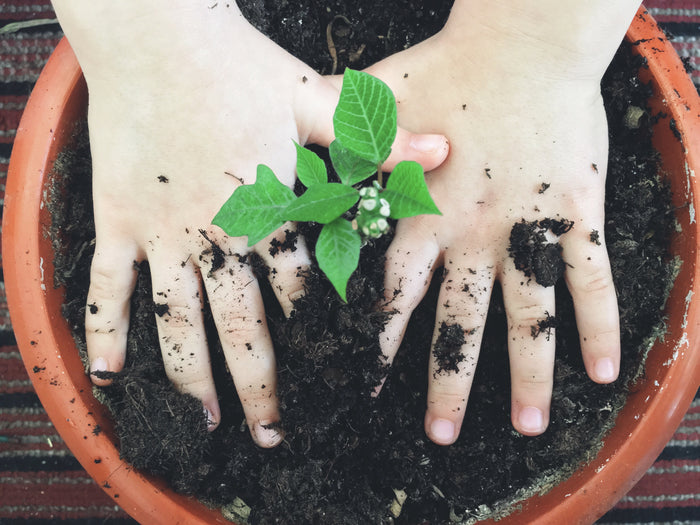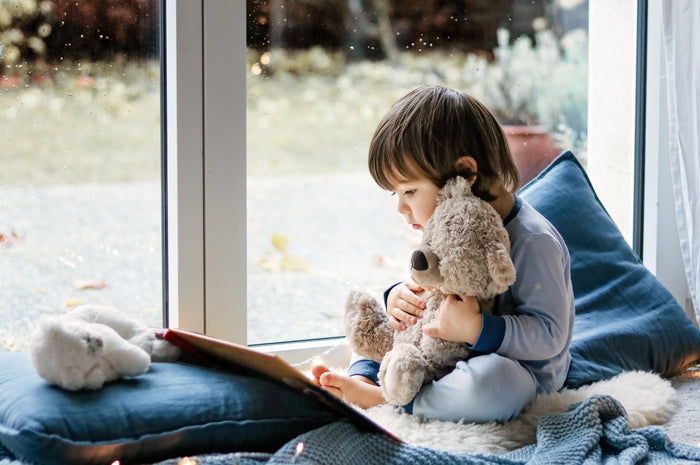10 Mental Health Benefits of Gardening

Research has shown that spending time outside is good for our bodies and our minds. I'm sure you've experienced these benefits: After feeling stressed out or bored indoors, you step outside and your spirits lift.
One great way to spend time outdoors is to garden. My dad always had a garden when I was a kid, and now I understand more about what drew him to it. I've always enjoyed being outside and gardening, but it took on special significance for me when I was recovering from an extended illness. As I began to recover, I felt compelled to greatly expand my garden beds and the things I planted, even though I was still struggling physically and mentally.
The experience seemed to accelerate my own healing. It felt like even as I was building the garden, it was helping me come back to life. One day as I stood in the afternoon sunlight and looked with amazement at all that had grown, I felt my own strength that had returned over the same stretch of time.
This personal experience, along with numerous studies about the positive effects of time outside, made me curious to explore the many benefits of gardening. Recently I discussed this topic on the Think Act Be podcast with professional gardener Joe Lamp'l, creator of joe gardener®. Here are 10 benefits of gardening that emerged from our conversation:
1.
Most of our suffering comes from trying to control things that we can't. The more we can accept the limits of our control and the unpredictability of life, the more peace of mind we can find—and gardening is a great way to practice. "Every day is one more reminder from Mother Nature that I'm not in control," Lamp'l said, which he finds helpful as a self-described "control freak."
I learned to practice acceptance in my own garden as the first baby lettuces were ready to harvest in mid-April. I had looked forward to spending time in the garden with my family, but when my 4- and 8-year-old daughters asked if they could help me harvest the lettuce, I was less than enthusiastic. What if they "messed up" my carefully planted garden? What if they broke off the stem instead of a leaf?
Thankfully, I managed to get over myself and welcome them into the garden even with the possibility that they could break something. I realized that a "perfect garden" could wind up being a pretty lonely place, which wasn't my idea of perfection.
Acceptance in the garden or elsewhere doesn't mean giving up, of course. We bring our best efforts to what we can control, and we let go of the rest. With gardening that means "preparing the best environment you can possibly make for your plants," said Lamp'l, and allowing nature to take it from there. Your garden (like your life) is in bigger hands than yours.
2.
If you're prone to perfectionism, you're probably well aware of the costs. Trying to make things perfect can lead to frustration, missed deadlines and opportunities, and strained relationships. It can also lead to not even trying to do something, with a mentality of "why bother if it can't be perfect?"
Given the lack of control we have, gardening can be a good antidote for perfectionism. No matter how carefully you plan and execute your garden, there are countless factors you can't predict—invasions by bugs, inclement weather, hungry rodents. Years ago one of our neighbors had a beautiful garden growing until a neighboring resident sprayed weed killer on a windy day, damaging many of my neighbor's vegetable plants.
Gardening offers an endless supply of these kinds of "neutralizers for perfectionism," as Lamp'l called them. He confessed to being a perfectionist himself and knows firsthand that "pursuit of perfection is a waste of time—especially in the garden. So don't bother!"
3.
The inability to garden perfectly is actually cause for celebration. Psychologist Carol Dweck developed the distinction between "fixed" and "growth" mindsets, and gardening is a great opportunity to develop the latter. With a growth mindset, we assume that we're constantly learning. When something doesn't work out the way we had hoped, we view it as a learning opportunity rather than as a "failure."
We can even look forward to our mistakes. "I love making mistakes," said Lamp'l, "because I look at them as a chance to learn something new. Through those mishaps, you can understand what happened and why, and you can be empowered to relate that learning to new things." So more mistakes just mean more learning and more growing.
I certainly make my share of gardening mistakes and find a growth mindset to be so helpful. For example, this season I experimented with a seeding method that I didn't do quite right and ended up with plants that were overcrowded and nearly impossible to disentangle when it came time to put the seedlings in the garden beds. My initial reaction was to feel stress about needing to "do it the right way," and then I realized all I had to do was the best I could do, and I would learn something for my fall planting.
4.
Few things boost our well-being like good relationships, and gardening offers ample opportunities to connect with others. Lamp'l noted that "gardening is one of the best ways to connect strangers" and quickly become friends "because we have that gardening thing in common."
I've experienced that quick connection myself when meeting other gardeners, and there's so much to talk about—not only the nuts and bolts of gardening but the emotional and spiritual connections we can experience with our gardens. "It's a collective effort," said Lamp'l, "and we're all better together when we share our experiences."
5.
Gardening provides a connection not just to other people but to our world. Many people feel that connection in a visceral way when they eat food they've just harvested. "We all have an innate connection to the earth," said Lamp'l, "and that connection manifests itself when we consume what came from the ground—which is where we came from and where we all end up."
Having a garden really means having a relationship with the plot of ground you're tending. Since I've gotten more into gardening I've had to be much more aware of the elements: the first and last frosts of the season, how much rain we've had, the temperature, where sunlight falls throughout the day. Gardening also connects us intimately with the cycle of the seasons.
And as Lamp'l described, it's easy to feel "like a parent" to one's growing plants. "You nurture the seedlings and do everything you can for them," he said, "and then it's like you're putting your babies in the soil"—much as we might nurture a young child who eventually heads out to meet the world. "They don't call it a 'nursery' for nothing!" Lamp'l continued. "I put a lot of care and emotion into the garden."
6.
The Japanese expression "shinrin-yoku" can be translated as "forest bathing," which nicely captures the experience of being immersed in green. A growing body of research has found all kinds of benefits from being in natural landscapes.
These studies have found evidence that being in green, or even being able to look out on a green landscape, is linked with better recovery from surgery, less anxiety and depression, better stress management, and many other positive effects.
The nice thing about a garden is that it can be right out your back door. And while you could just as easily spend time sitting in your yard, you're much more likely to be outside consistently when the work of a garden requires it.
7.
Mindful presence is tied to a long list of positive outcomes, like relationship satisfaction and less emotional reactivity. The garden can be a protected place where we practice being where we are and actually doing what we're doing.
Lamp'l described finding his "Zen moment" in his garden, where he tunes in to his experience. For example, while he generally loves to listen to podcasts, he doesn't when he's in the garden. "That's sacred time for me," he said. "When I'm out there weeding, I want to hear the birds. I don't want to hear anything else. It's a quiet time, and I relish it."
I often find that centering effect in my own garden. Just last night after heavy rain I sat in my garden in the dying light of the day and took in what was around me. It was striking how quickly I felt a sense of ease.
8.
Moving your body regularly is an effective way to boost mood and lower anxiety, and gardening offers "no shortage of opportunities for physical activity," said Lamp'l. Even when he's not able to get to the gym consistently, he maintains muscle tone and feels good through daily work in his garden.
The movements are varied, too, which may mean fewer repetitive use injuries compared to more structured exercise. "When I do my weeding, I'm on my belly, on my butt, lying on my side—doing a lot of things you probably do in a yoga class," he said. "I can give up my gym membership."
9.
Not surprisingly, time in your garden can be a great way to release stress. There's something about feeling the life all around you, the warmth of the sun, the soil in your hands. As I sit in my own garden these days I see rainbow Swiss chard and lettuces shaking in the wind, blueberries, blackberries, and strawberries ripening, and feel the breeze as clouds move across the blue sky.
Just don't forget to spend time simply being in your garden. There's always the next thing to do, as Lamp'l pointed out, so take time deliberately to step away from activity and experience what's around you.
10.
Last but not least, a garden can yield the freshest and healthiest foods available—the types of food that can have a significant impact on our mental health. For example, two studies showed that dietary changes can be an effective treatment for depression.
Studies in this area tend to find benefits of the "Mediterranean" (and similar) diet, which emphasizes consuming minimally processed whole foods—exactly the types of food that your garden will yield. Plus there's the added benefit of knowing you played a role in growing the food.
How to Get Started
Ready to start a garden of your own? Here are six quick tips that Lamp'l recommends for beginners.
1. Just start. Decide that you're going to get started, even though you don't know how it's going to go or even exactly what you're doing. "Try it, and so what if you fail?" asked Lamp'l. "The worst that will happen is you'll learn something. And that's worth the price of a plant, every time."
2. Start slow. Lamp'l noted that it's easy to get excited when starting out and plant too much, which ends up being hard to keep up with. As a result, you could end up feeling overwhelmed and discouraged. So get started, but don't overdo it. You can always add to your garden over time. A simple first step is to grow something in a container that you can put close to your house, so it's easy to take care of and enjoy seeing every day.
3. Focus on healthy soil. Successful gardening starts literally from the ground up, according to Lamp'l. "Soil is life. When you focus on that, good things happen." He strongly advises gardeners to avoid synthetic chemicals and "start feeding the soil with organic material." That can include compost, the "single best thing you can add to the soil because there's so much in it," and anything else that nature provides, like shredded leaves, shredded bark, or aged manure.
4. Grow what you like. Choose fruits and vegetables to grow based on "what you want to eat or what you like looking at," advised Lamp'l. "Grow something that's easy and that grows quickly, like a radish or lettuce." The ease and quick reward will be the motivation to stick with it.
5. Know your plants' needs. "Learn something about the plant before you stick it in the ground," said Lamp'l. "Read the plant tag so you know if it likes sun or shade and wet or dry, and do your best to give it the environment it wants to thrive in." After all, plants can't move, so it's up to us to "put the right plant in the right place." Your plants will reward you for it.
6. Pay attention to your plants. Spend at least a little time in your garden every day observing what's happening. That way you can "be proactive when problems arise and can circumvent potentially bigger problems," said Lamp'l. Besides, there's really no downside to spending time in your garden, given all the benefits discussed here












































